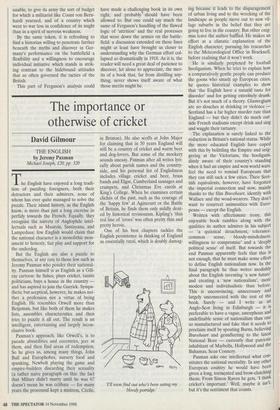The importance or otherwise of cricket
David Gilmour
THE ENGLISH by Jeremy Paxman Michael Joseph, f20, pp. 320 The English have enjoyed a long tradi- tion of puzzling foreigners, both their detractors and their admirers, none of whom has ever quite managed to solve the puzzle. Their island history, as the English know, is more than just a long exercise in perfidy towards the French. Equally, they recognise the naivety of Anglophile intel- lectuals such as Maurois, Santayana, and Lampedusa: few English would claim that the national character is a monolithic mon- ument to honesty, fair play and support for the underdog.
But the English are also a puzzle to themselves, at any rate to those few such as Jeremy Paxman who ponder their national- ity. Paxman himself is as English as a Gill- ray cartoon: he fishes, plays cricket, taunts politicians, buys a house in the country and has aspired to join the Garrick. Sympa- thetic but sceptical, however, he makes nei- ther a profession nor a virtue of being English. He resembles Orwell more than Betjeman, but like both of them he makes lists, assembles characteristics and then tries to puzzle it all out. The result is an intelligent, entertaining and largely incon- clusive book.
Paxman's approach, like Orwell's, is to parade absurdities and eccentrics, jeer at them, and then find areas of redemption. So he gives us, among many things, John Bull and Europhobes, nursery food and spanking, Newbolt playing the game and empire-builders discarding their sexuality (a rather naive paragraph on this: the fact that Milner didn't marry until he was 67 doesn't mean he was celibate — for many years the proconsul kept a mistress, Cecile, in Brixton). He also scoffs at John Major for claiming that in 50 years England will still be a country of cricket and warm beer and dog-lovers. But some of the mockery sounds uneasy. Paxman after all writes lyri- cally about parish names and the country- side, and his personal list of Englishness includes village cricket and beer, brass bands and Elgar, Cumberland sausages and crumpets, and Christmas Eve carols at King's College. When he examines certain clichés of the past, such as the courage of the 'happy few' at Agincourt or the Battle of Britain, he finds them only mildly dent- ed by historical revisionism. Kipling's 'thin red line of 'eroes' was often pretty thin and pretty heroic.
One of his best chapters tackles the English persistence in thinking of England as essentially rural, which is doubly damag- 'I'll soon find out who's been eating my bloody porridge.' ing because it leads to the disparagement of urban living and to the wrecking of the landscape as people move out to new vil- lage suburbs in the belief that they are going to live in the country. But other enig- mas leave the author baffled. He makes an effort at a climatic explanation of the English character, pursuing his researches to the Meteorological Office in Bracknell, before realising that it won't work.
He is similarly perplexed by football hooliganism. When he tries to explain how a comparatively gentle people can produce the goons who smash up European cities, he quotes historical examples to show that 'the English have a natural taste for disorder' and for getting extremely drunk. But it's not much of a theory. Glaswegians are no slouches at drinking or violence Scotland has a far higher murder rate than England — but they didn't do much out- side French stadiums except drink and sing and waggle their tartanry.
The explanation is surely linked to the reduction in Britain's national status. While the more educated English have coped with this by belittling the Empire and snig- gering at the Victorians, the hooligans, dimly aware of their country's standing when it had an empire and won world wars, feel the need to remind Europeans that they can still sack a few cities. Their Scot- tish equivalents, however, have forgotten the imperial connection and now, mainly thanks to the film Braveheart, identify with Wallace and the woad-wearers. They don't want to resurrect animosities with Euro- peans — except the English. Written with affectionate irony, this enjoyable book rambles along with the qualities its author admires in his subject — 'a quizzical detachment, tolerance, common sense, bloody-mindedness, willingness to compromise' and a 'deeply political sense' of itself. But towards the end Paxman apparently feels that this is not enough, that he must make some effort to define English nationalism now. In the final paragraph he thus writes modishly about the English inventing 'a new future' and creating a 'new nationalism', more modest and individualistic than before. This is unconvincing, unnecessary and largely unconnected with the rest of the book. Surely — and I write as an Anglo-Scot living in Edinburgh — it is preferable to have a vague, amorphous and undefinable sense of nationalism than one so manufactured and fake that it needs to proclaim itself by spouting Burns, believing Braveheart and genuflecting to the latest National Bore — currently that patriotic inhabitant of Marbella, Hollywood and the Bahamas, Sean Connery.
Paxman asks one intellectual what con- stitutes the national mentality. In any other European country he would have been given a long, tormented and brow-clutching thesis. From Simon Raven he gets, 'I think cricket's important.' Well, maybe it isn't, but it's the sentiment that counts.


















































































 Previous page
Previous page